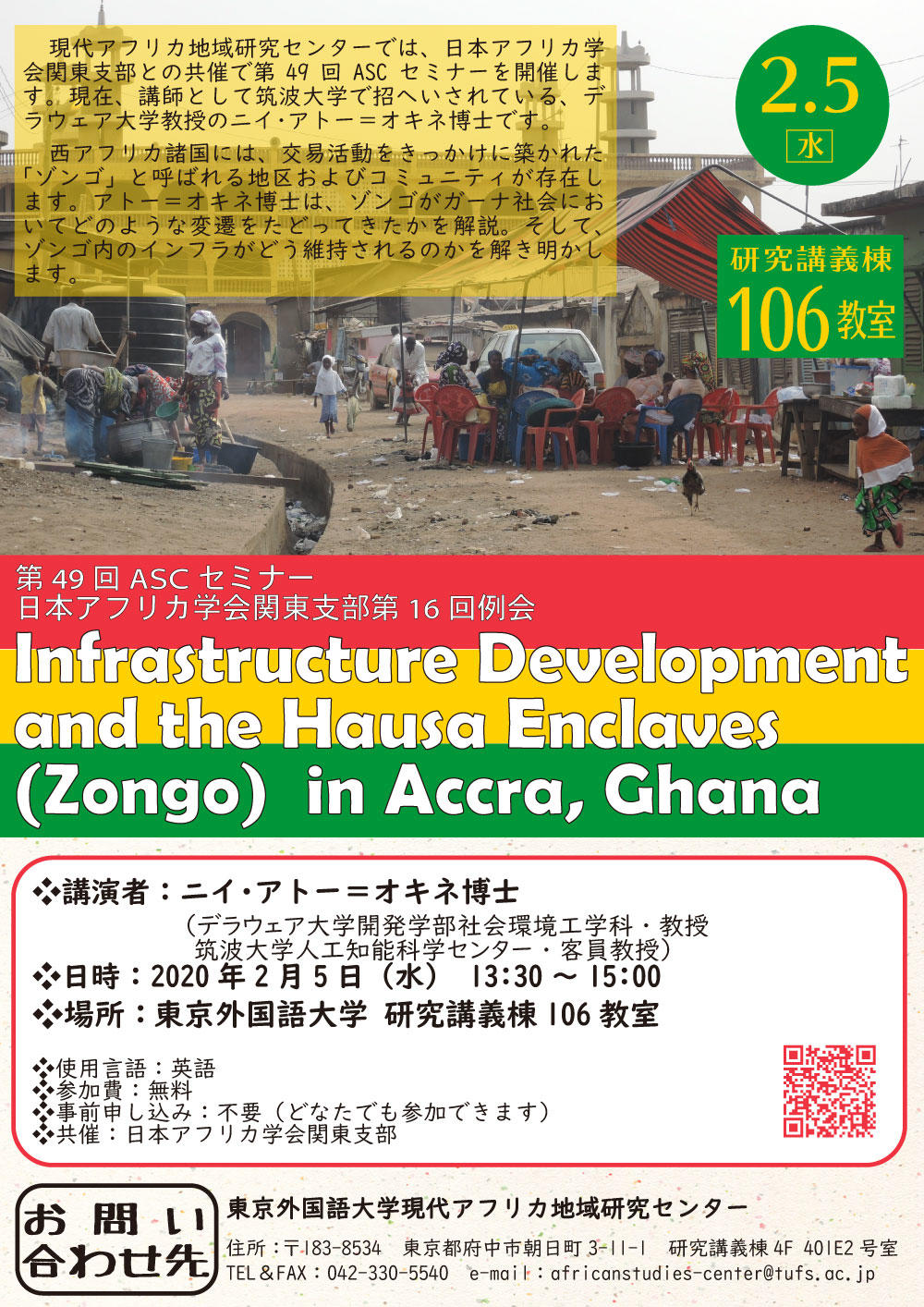現代アフリカ地域研究センターでは、日本アフリカ学会関東支部との共催で第49回ASCセミナーを開催します。現在、講師として筑波大学で招へいされている、デラウェア大学教授のニイ?アトー=オキネ博士です。
西アフリカ諸国には、交易活動をきっかけに築かれた「ゾンゴ」と呼ばれる地区およびコミュニティが存在します。アトー=オキネ博士は、ゾンゴがガーナ社会においてどのような変遷をたどってきたかを解説。そして、ゾンゴ内のインフラがどう維持されるのかを解き明かします。
◆演題:Infrastructure Development and the Hausa Enclaves (Zongo) in Accra, Ghana
◆講演者:ニイ?アトー=オキネ博士
(デラウェア大学開発学部社会環境工学科?教授、筑波大学人工知能科学センター?客員教授)
◆要旨:Zongos are areas of contemporary West African towns established as a result of trading activities. In Ghana, they mostly came into existence before colonization. The word 'Zongo' comes from the Hausa 'zango,' which means 'temporary settlement.' Contemporary Zongos are often characterized by overcrowding and inadequate sanitation, and represent, both symbolically and practically, a condition that is between inclusion and exclusion. For example, a classical example of Zongo is Nima (Accra) which was settled in 1931 by Hausa cattle dealers. In 1947 the colonial town planning office complained about rapid growth of the area, and how residents constructed homes, kiosks, and mosques wherever they could find land, often without direct access to roads, water, a good sanitation system, among others. The government of Ghana in the recent years formed a new Ministry of Inner City and Zongo Development. The main objective of this Ministry is to develop an inclusive and sustainable inner city and Zongo. In this talk, I will discuss how physical infrastructure like roads, drinking water and sanitation can be maintained once constructed within the zongo communities. How basic "report cards" can collected by the opinion leaders in the Zongo communities and also introduce the youth to basic infrastructure monitoring and assessment in their community.
◆講演者略歴:Nii Attoh-Okine is a Full Professor at the Civil and Environmental Engineering Department, University of Delaware, United States. His research interests are in the area of resilience engineering, computational intelligence and large data analytics in infrastructure systems and smart cities. He serves as an Associate Editor of various journals; few examples include ASCE American Society of Civil Engineers/American Society of Mechanical Engineers (ASME) Journal of Risk and Uncertainty, ASCE Journal of Computing in Civil Engineering. He is also on the Editorial Board of the Journal of Construction and Building Materials. He is the author of the following books: Resilience Engineering: Models and Analysis [Cambridge Press 2016], and Big Data and Differential Privacy: Analysis Strategies for Railway Track Engineering [John Wiley, 2017].
◆日時:2020年2月5日(水) 13:30~15:00
◆場所: 東京外国語大学 研究講義棟106教室
◆使用言語:英語
◆参加費:無料
◆事前申し込み:不要(どなたでも参加できます)
◆共催:日本アフリカ学会関東支部


